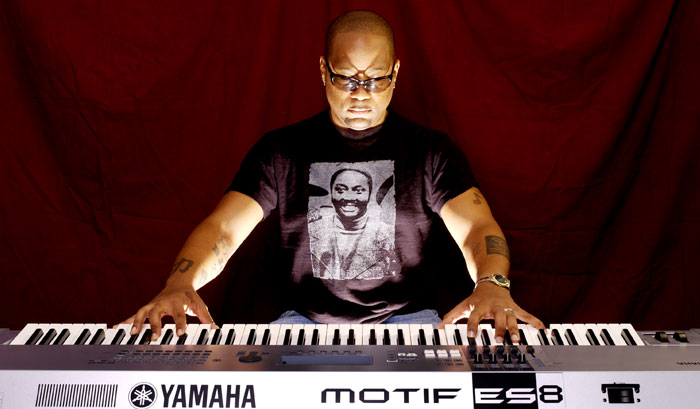Keyboardist and musical director Kenneth Crouch has worked with such artists as Lenny Kravitz, Eric Clapton, Destiny’s Child, Lauryn Hill, Brandy, and Marc Anthony. Blessed with talent and born into a musical family (his uncle is gospel legend Andrae Crouch), it seems Crouch was destined for a career in music. But it almost didn’t happen that way. “When I was a kid, my mother asked if I wanted piano lessons,” Kenneth recalls. “She told me years later that I took lessons for about a year, and the piano teacher told her I wasn’t catching on! But I kept at it, and somehow I did catch on in the next few months.” For the young Kenneth, his uncle Andrae was a big influence. “Growing up in a church household, we weren’t able to listen to secular music,” he says. “So hearing my uncle was like hearing Michael Jackson or Sly Stone or Earth Wind & Fire for us. Anytime he had a new record out, we were very excited.” In addition to playing in church, Kenneth studied classical music, and became interested in jazz in his early teens. From there it was a short journey to pop music, he says. “Jazz players play lots of songs out of the fake book, basically just the pop tunes of the ’40s, ’50s, and ’60s. So it was a natural progression to go in that direction.” Crouch’s first big break came when the newly-signed Lenny Kravitz, whom he had known since high school, tapped him to join his touring band. “He asked me to come out to New York for a few weeks, and I ended up working with him for two years, playing all over the world,” he recalls. Since then, Crouch has worked with top artists in a number of genres. “I’ve played and recorded with the Temptations, Toni Braxton, Nancy Wilson, Vanessa Williams, and Babyface,” he says. “I was terrified when I started to work with Chaka Khan and Terence Trent D’Arby. But once you get past the surface, you realize that they’re just cats doing music like anyone else.” For the past five years, Kenneth has served as musical director for Marc Anthony. “With Marc, I have to deal with both pop and pop- Latin styles, where you have to be conscious of the clave rhythm,” he says. “I have to make sure it’s not handled in a way that’s corny and phony. The payoff is hearing the crowd scream. It’s great when people respect your integrity in any genre you do.” The role of musical director brings unique challenges and opportunities, says Crouch. “It’s my job to make the person whose name is on the marquee look and sound the best they can. I try to create a live show that’s better than the record. And it usually does get better, because the artist has internalized the material, and they’re performing it to the crowd.” Of course, it helps to have the right sounds at his fingertips. Crouch is a longtime fan of Yamaha keyboards, especially his current Motif ES8. “It’s my all-in-one,” he says. “I’ve gotten rid of 95% of my gear, and I do almost everything with virtual instruments these days. The only thing I use outside the virtual world is the Motif. It has honest piano and Rhodes sounds. I can use the onboard EQ to tweak the piano sounds lighter or darker on the fly. This may sound like a big plug, but it’s not: I’ve helped sell Motifs! Anytime I go to the music store, I end up recommending it. Especially because of the great feel, which is so important.” In addition to his work with Marc Anthony, Crouch recently recorded with artist Daniel Bedingfield. And, he says, “I’m finally working on some stuff for myself. I recorded some things in Belgium a few months ago. After I finish this upcoming tour with Daniel Bedingfield and Marc Anthony, I’m going to go back there to record some more.” Besides talent and the right gear, what are some of the essential skills for making it in the music business? “Be cool,” says Crouch. “Be nice to people. The young guy you give a little tip to today could be the cat writing your check years later. Don’t be afraid to share your sounds and techniques, because nobody can really take anything from you. The best sounds and sequencers I have are between my ears. Learn as much as you can. Play as many types of music as you can. And be cool to people! I’d rather work with a 60% player with a great attitude than a 100% player with a horrible attitude. Having an attitude is unnecessary, because there are always a million musicians who are way better than you.” from http://www.yamaha.com
